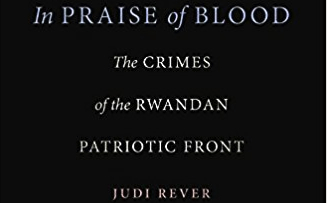[Commentary]
On April1, 2019, Judi Rever, award winning Canadian author of “
In Praise of Blood: The Crimes of the Rwanda Patriotic Front” is scheduled to give a speech at Tarrant County College NE Campus in Hurst, Texas. Her book exposes crimes committed by Rwanda’s current government before, during and after the 1994 Rwandan genocide when the Rwanda Patriotic Front (RPF), then led by current president Paul Kagame slaughtered, burned and buried in mass graves thousands of innocent Rwandans and Congolese.
Rever’s findings are based on decades of research and the findings of a secret investigative unit of the International Criminal Tribunal for Rwanda, which operated under UN auspices from 1994 to 2015. Some of the panelists who will join Rever also survived the carnage in 1994 and the aftermath, when the RPF pursued the two million refugees over the border into Zaire—now Congo–
possibly committing genocide itself in the process. These atrocities were documented in the
UN Mapping Exercise Report released in October 2010.
Earlier this week, a group calling itself Rwanda Community Abroad in the USA along with a man named Willis Shalita published two articles in an online tabloid called Express News denouncing Rever, claiming her findings are baseless and that she is a “genocide denier”. It is evident that the articles were either written by the same person or just plain plagiarism as evidenced by the last three paragraphs in both articles. This is nothing new when it comes to Rwandan government propagandists’ missteps: on March 20, two articles with the same titles but different authors appeared in two Rwandan newspapers known for being government mouthpieces: “The New Times” and “KT Press”.
The purpose of such hate found in these articles is to shame the school into canceling Rever’s speech.
I am a genocide survivor. I came to the US when I was a teenager having fled my country during the massacres. At one point, my mother and I were ordered to dig our own graves. Since my survival, I have researched the history of my country and continue to follow developments closely.
Rever’s findings are absolutely
credible and well-documented. Those of us in the Rwandan community who support freedom, liberty and independence are grateful that Tarrant County College is hosting Rever and her co-panelists, and that the millions of Rwandans and Congolese who lost their lives in the Great Lakes wars and genocides of the 1990s will be commemorated by the school.
The two Express News articles denouncing Rever are straight from the government of Rwanda’s playbook. The truth about the RPF’s human rights record is something the Rwandan government continues to fight tooth and nail to keep hidden. Inside Rwanda, dozens of journalists have been
imprisoned, tortured, or driven into exile. Credible international organizations such as Reporters Without Borders have labeled Rwanda’s president Kagame as a
predator against press freedom.
Kagame’s political opponents are also routinely harassed and jailed. Victoire Ingabire Umuhoza was jailed for eight years when she challenged Kagame in the 2010 elections, claiming to speak for all Rwandans who suffered in the genocide, Tutsi and Hutu alike. Diane Rwigara, who has accused Rwandan security forces of killing her father, was also jailed after challenging Kagame in the 2017 elections. In 1998, former Kagame ally and Rwandan Minister Seth Sendashonga was assassinated in Nairobi Kenya after calling for an investigation into the
infamous Kibeho massacre of Hutus in the IDP camp in southern Rwanda. Kagame effectively admitted to the assassination this month in a speech, stating that Sendashonga had “
crossed the line”.
The government of Rwanda has agents deployed abroad who harass those Rwandan refugees who want the truth to be known. They have carried out assassinations, physical attacks and kidnappings of Rwandan dissidents in South Africa, Kenya, Uganda, Congo as well as multiple attempts in the UK among other places. In countries, like the US where they are unable to carry out these criminal acts, agents of the Rwandan government use various forms to spread hate, as well as harassment and intimidation against those who disagree with them and attempt to expose the truth. Their main tactic is silencing dissidents and survivors of the massacres—and those who speak for them, such as Rever.
This is why Tarrant Community College’s willingness to let the truth be told is so important.
Claude Gatebuke is a Rwandan War and Genocide Survivor and the Executive Director of the African Great Lakes Action Network


Comments are closed.